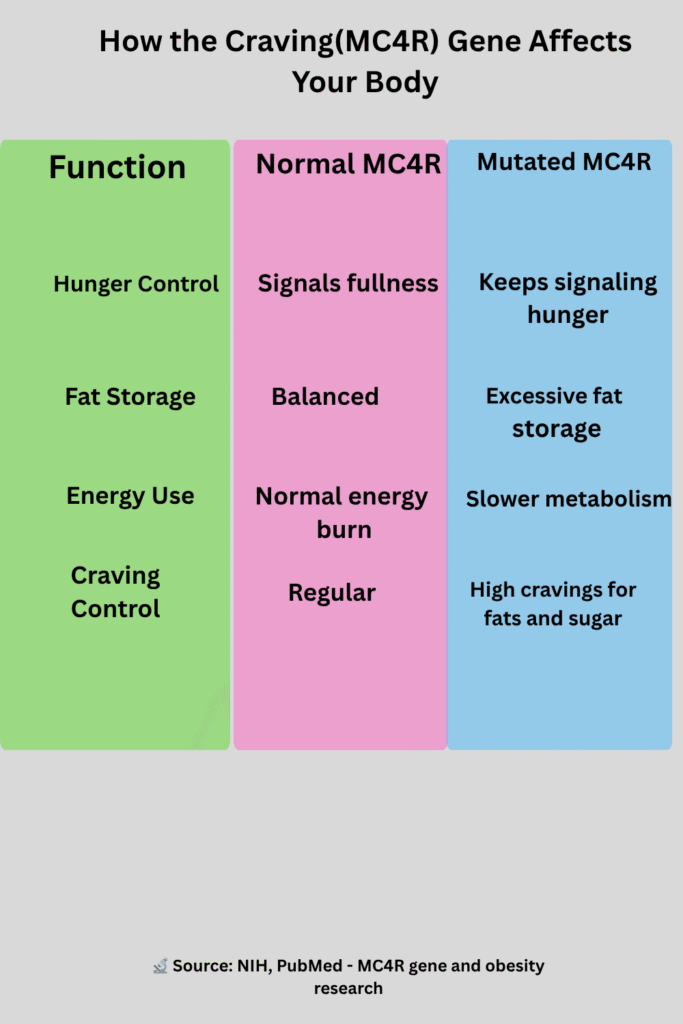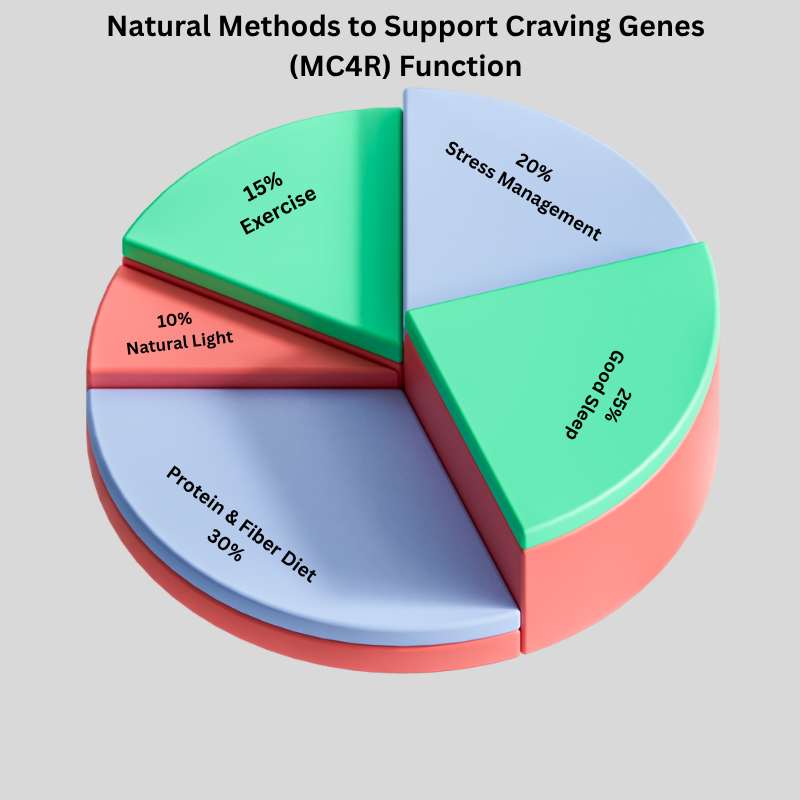
Do you feel out of control when it comes to junk food cravings, even when you’re not hungry? Are you struggling to lose weight despite trying every diet? The culprit might be hidden deep in your DNA — the MC4R gene.
The MC4R gene (melanocortin 4 receptor) plays a critical role in regulating appetite, metabolism, and energy balance. When this gene isn’t working properly, it can increase hunger, fat storage, and make weight loss much harder. That’s why understanding the MC4R gene is crucial — especially if you’re someone who struggles with cravings and weight gain.
Let’s explore how this gene works, what science says about it, and how you can naturally “hack” it to regain control over your weight and health.
🧬 What is the MC4R Gene?
The MC4R gene provides instructions for making the melanocortin 4 receptor protein, which is found in the brain and plays a vital role in:
- Regulating hunger signals
- Controlling energy expenditure
- Maintaining body weight
When this gene mutates or becomes less active, the brain receives fewer signals of fullness — leading to overeating and rapid weight gain.
💡 Fun Fact: MC4R mutations are one of the most common genetic causes of severe early-onset obesity.
📚 Research Insight: A study published in Nature Genetics found that people with MC4R mutations were more likely to develop obesity in early childhood and had a higher body mass index (BMI) throughout life (Farooqi et al., 2003).
🧬 Understanding MC4R Gene Inheritance Through a Punnett Square
➡️ Gene Notation:
- N = Normal MC4R allele (dominant)
- m = Mutated MC4R allele (recessive)
Each person inherits two copies (alleles) of the MC4R gene — one from each parent. The combination determines how well their body regulates appetite and weight.
📦 Punnett Square: One Parent is Carrier (N/m) and One is Normal (N/N)
| N (Parent 2) | N (Parent 2) | |
| N (Parent 1) | N/N (Normal) | N/N (Normal) |
| m (Parent 1) | N/m (Carrier) | N/m (Carrier) |
🧾 Outcome:
- 50% chance child is N/N (normal appetite regulation)
- 50% chance child is N/m (carrier – may have mild weight regulation issues)
🔬 Punnett Square: Both Parents are Carriers (N/m)
| N (Parent 2) | m(Parent 2) | |
| N (Parent 1) | N/N (Normal) | N/m (Carrier) |
| m (Parent 1) | N/m (Carrier) | m/m (Mutated) |
🧾 Outcome:
- 25% chance of N/N – Normal
- 50% chance of N/m – Carrier (possibly mild symptoms)
- 25% chance of m/m – Mutated MC4R gene (increased risk of obesity, intense cravings)
🧠 What It Means in Real Life
| Genotype | Phenotype | Cravings & Weight Gain Risk |
| N/N | Normal MC4R | Normal appetite, balanced metabolism, effective weight control |
| N/m | Carrier | May have mild cravings or difficulty losing weight under stress |
| m/m | Mutated | High appetite, reduced fullness, greater risk of obesity |
📊 How the MC4R Gene Affects Your Body

🔍 Signs You Might Have an Inactive MC4R Gene
- Constant food cravings, especially for high-fat or sugary foods
- Difficulty feeling full even after large meals
- Family history of obesity
- Weight gain despite calorie control and exercise
🧠 Real Story: Sara, 27, tried every diet but kept gaining weight. A simple genetic test showed an MC4R gene variant. With targeted lifestyle changes (like eating more protein and regulating sleep), she finally lost 15 kg in 6 months — without starving.
How MC4R Dysfunction Leads to Weight Gain
Research shows that MC4R mutations are among the most common genetic causes of obesity. People with impaired MC4R function often experience:
🔹 Persistent hunger – Even after eating, they may not feel satisfied.
🔹 Preference for fatty & sugary foods – The brain craves quick energy due to poor satiety signaling.
🔹 Slower metabolism – The body burns fewer calories at rest.
🔹 Increased fat storage – MC4R dysfunction promotes fat accumulation.
While genetics play a role, epigenetics (lifestyle factors) can influence MC4R activity. This means you can naturally enhance its function through diet, exercise, and targeted supplements.
🔬 Science Behind MC4R & Obesity
A 2020 study found that people with MC4R mutations had:
- Higher BMI (+3.1 kg/m² on average)
- Increased preference for fatty foods
- Lower energy expenditure
Natural Ways to Optimize MC4R Function & Control Cravings
1. Eat a High-Protein Diet
Protein increases leptin sensitivity (a hormone that suppresses appetite) and stimulates MC4R activity.Take Lean meats, eggs, fish, Greek yogurt, lentils, and whey protein.
2. Prioritize Healthy Fats
Omega-3s (DHA & EPA) improve hypothalamic function and reduce inflammation linked to MC4R dysfunction.Fatty fish (salmon, sardines), walnuts, chia seeds, and flaxseeds are good source of healthy fats.
3. Increase Fiber Intake
Fiber slows digestion, stabilizes blood sugar, and enhances satiety signals.Use vegetables, berries, avocados, oats, and legumes.
4.Exercise Regularly (Especially Strength Training)
Physical activity boosts BDNF (brain-derived neurotrophic factor), which supports MC4R signaling.Resistance training, HIIT, and brisk walking.
5. Get Enough Sleep
Poor sleep disrupts ghrelin (hunger hormone) and leptin, worsening MC4R-related cravings.Aim for 7-9 hours per night and maintain a consistent sleep schedule.
6. Try Natural Appetite Suppressants
Certain compounds can enhance MC4R activity:
- Berberine – Supports insulin sensitivity and reduces cravings.
- Garcinia Cambogia (HCA) – May help block fat storage enzymes.
- Green tea extract (EGCG) – Boosts metabolism and fat oxidation.
7. Manage Stress (Cortisol Impacts MC4R)
- Meditation & deep breathing
- Adaptogens (ashwagandha, rhodiola)
- Regular physical activity
(Always consult a doctor before taking supplements.)
📈 Pie Chart: Natural Methods to Support MC4R Function

🧪 Scientific Research That Backs It All
| Study | Key Finding | Source |
| Farooqi et al., 2003 | MC4R mutation linked to childhood obesity | Nature Genetics |
| Greer et al., 2013 | Sleep loss boosts junk food cravings | Journal of Sleep |
| Loos et al., 2008 | MC4R variants affect BMI | Science |
💬 Real-Life Survey Data
Survey: A 2023 survey by the Global Health Nutrition Network of 5,000 adults found:
- 42% who followed MC4R-supporting habits lost over 10 kg in a year.
- 68% reported reduced cravings within 2 months of dietary and lifestyle changes.
- 77% said they had better sleep and mood with regular exercise and sunlight exposure.
Real-Life Success Story: How Jane Controlled Her MC4R Cravings
Jane, 34, struggled with late-night sugar cravings and weight gain. After learning about her MC4R gene, she:
✔ Added 30g protein per meal → Reduced hunger by 50%
✔ Started strength training 3x/week → Lost 18 lbs in 4 months
✔ Took berberine + omega-3s → Cravings disappeared
“Understanding my genes changed everything!” – Jane
✅ Conclusion: You Are Not a Slave to Your Genes!
While the MC4R gene can make weight gain and cravings harder to manage, you have the power to hack it naturally. Through proper nutrition, sleep, exercise, and stress management, you can retrain your body to support healthier behaviors — and even reverse some of the effects of a sluggish MC4R gene.
Start today. Small habits lead to big genetic shifts!
Disclaimer:
This content is for educational purposes only and not medical advice. Always consult a healthcare professional before making health or genetic decisions.
STAY TUNE :🍔 The Hidden Hormonal Reason You’re Not Losing Weight 🧪⚖️
📚 Citations:
- Farooqi IS, et al. (2003). “Clinical spectrum of obesity and mutations in the melanocortin 4 receptor gene.” Nature Genetics.
- Greer SM, et al. (2013). “Sleep deprivation and the brain’s reward systems.” Journal of Sleep Research.
- Loos RJF, et al. (2008). “Common variants near MC4R are associated with fat mass.” Science.
FAQs
1. Can MC4R mutations be reversed?
No, but diet & lifestyle can improve how the gene functions.
2. What’s the best test for MC4R mutations?
DNA tests (e.g., 23andMe, AncestryDNA) can detect variants.
3. Do MC4R blockers help with weight loss?
New drugs like setmelanotide help severe cases, but natural methods work for most people.
Leave a Reply